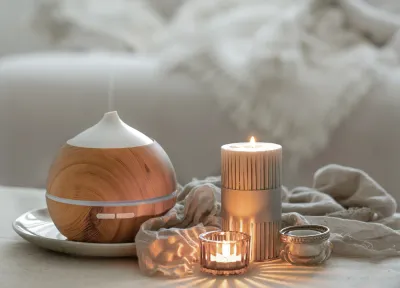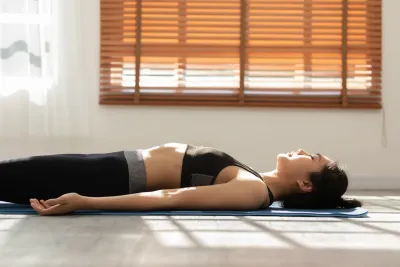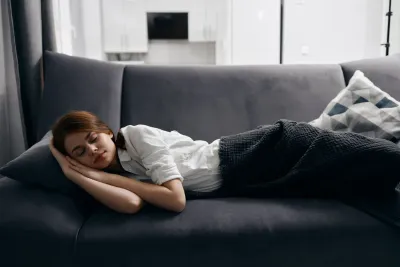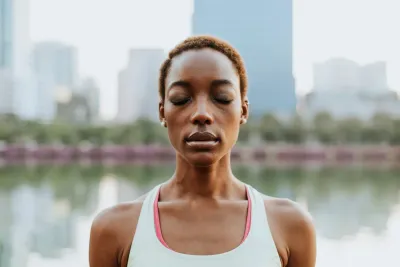Calming Scents That Promote Sleep and Relaxation
Ana Marie Schick: Resident Sleep Expert and Certified Health Coach • Nov 12, 2024

Key Takeaways
Calming scents can support better sleep by relaxing the nervous system and helping the brain transition from alertness into rest.
- Scents such as lavender, chamomile, and sandalwood are known to reduce stress and promote relaxation, which can make it easier to fall asleep.
- Aromatherapy works through the brain’s limbic system, the area responsible for emotion and memory, helping signal safety and calm before bedtime.
- Using scents through diffusers, pillow sprays, or essential oils is a simple way to reinforce a consistent nighttime routine.
- Research suggests regular exposure to soothing scents can improve sleep quality and may reduce symptoms of insomnia over time.
- For best results, choose high quality essential oils and use them consistently to build a strong association between scent and sleep.
Have you ever wondered why certain smells seem to transport you to a state of deep relaxation? It turns out our sense of smell has a powerful influence on our bodies and minds, including our sleep.
The right scents can create a soothing atmosphere, calm our nerves, and promote a restful night's sleep.
We'll look at the science behind aromatherapy and find out how specific scents affect sleep (familiar and unfamiliar smells) and why they can help you experience a more peaceful and rejuvenating sleep.
What Is Aromatherapy?
Aromatherapy, the practice of inhaling the calming scent of essential oils, is a natural remedy for, among other things, reducing stress, and it involves several smells that can help you “engage in a general state of calm.” [1] [2]
Calming scents that help you sleep include floral scent of jasmine, chamomile, and lavender. They can positively influence the nervous system, promoting relaxation, reducing stress, and enhancing sleep quality through their calming properties.
Pair Calming Scents With Cool Comfort
Pairing relaxing scents with a Chilipad Dock Pro can enhance your sleep experience. The combination of soothing aromas and the cooling comfort of a Chilipad creates the ultimate sleep environment.
The Science of Smell and Sleep
The sense of smell plays a significant role in our sleep patterns. Research has shown that certain calming scents can affect our brain’s ability to fall asleep, stay asleep, and even influence the quality of our sleep.
This is because the olfactory system, responsible for processing smells, is closely linked to the brain’s limbic system, which regulates emotions, mood, and memory.
When we inhale a scent, the molecules travel up our nostrils and bind to specialized receptors in the nasal cavity. These receptors send signals to the brain, which interprets the scent and triggers a response.
In the case of sleep, particular scents can promote relaxation, reduce stress and anxiety, and even lower blood pressure, making it easier to fall asleep.
Types of Aromatherapy
Aromatherapy is a natural healing method that uses plant extracts to boost your health and well-being. Let's take a closer look at the different types of aromatherapy.
Essential Oil Therapy
This form of aromatherapy is the most common, and it involves using calming essential oils that are extracted from plants. Natural scents, such as cedarwood, chamomile, and lavender, are particularly beneficial for relaxation and sleep, enhancing overall well-being.
These oils can be inhaled, applied to the skin, or added to baths. Some popular oils include lavender, peppermint, and eucalyptus, each with its own specific benefits, such as promoting relaxation, relieving pain, or providing respiratory support.
Aromatic Diffusion
This technique involves using diffusers to spread essential oils into the air, creating a pleasant-smelling space with a calming scent.
There are various kinds of diffusers, such as:
- Ultrasonic Diffusers: Using ultrasonic waves to produce a fine mist of water and essential oils.
- Nebulizing Diffusers: An atomizing process that does not require water or heat and preserves the oil’s integrity.
- Evaporative Diffusers: Use a fan to help dissipate the oil’s aroma into the air through evaporation.
- Heat Diffusers: Use heat to gently warm the oil, releasing its calming scent.
Topical Application
You can apply essential oils directly to your skin, usually mixed with a carrier oil like jojoba, coconut, or almond oil. This method is great for massages, lotions, and skincare products.
It's especially effective for targeting specific issues like muscle pain, skin conditions, or stress relief. And the scents smell amazing!
Did You Know: Incorporating essential oils into your daily life offers a beautiful, natural, and holistic method for stress relief.
Inhalation
Sure, here's a revised version of the original text: When using calming essential oils for inhalation, you can breathe in the aroma by placing a few drops on a tissue, using steam inhalation, or adding oils to a personal inhaler.
This method, a few drops, is helpful for addressing respiratory issues, boosting mood, and providing emotional support.
Aromatherapy Baths
Everyone enjoys a good soak in the bath! Adding essential oils to a warm bath can create a wonderfully relaxing and therapeutic experience, enhanced by the soothing and calming scent of the oils.
The heat from the water helps release the oils into the air and allows them to be absorbed through the skin.
Others include Aromatic Spritzers, Bath Salts, Facial Steamers, Hot and Cold Compresses, Clay Masks, Creams, or Lotions [3]
Popular Calming Essential Oils
And with more than 90 different types of essential oils out there, how do you know which one is the best?
Here's a list of the 10 most popular essential oils. These are the top calming scents that help you sleep.
- Peppermint: Boosts energy and aids digestion
- Lavender: It's calming effect relieves stress
- Sandalwood: Calms nerves and helps with focus. A warm, woody scent.
- Bergamot: Reduces stress and improves skin conditions like eczema
- Rose: Enhances mood and reduces anxiety
- Chamomile: Improves mood and relaxation
- Ylang-Ylang: Treats headaches, nausea, and skin conditions
- Tea Tree: Fights infections and boost immunity
- Jasmine: This floral scent helps with depression
- Lemon: Aids digestion, mood, headaches, and more [4]
Best Essential Oil for Sleep
But out of those 10, four are considered the best essential oils:
- Tea Tree Oil: Also called melaleuca, tea tree oil is commonly used for acne, athlete's foot and insect bites.
- Peppermint Oil: Though peppermint essential oil can relieve headaches, some evidence shows that peppermint “helps relieve irritable bowel syndrome (IBS) symptoms when taken in an enteric-coated capsule (from a trusted health supplement provider).”
- Lemon Oil: Known as a popular homemade cleaning product, lemon oil can also boost someone's mood.
- Lavender Oil: Lavender scent is often used to help relieve stress and anxiety and promote a better night's sleep. [5]
It has been reported that 43% of people who have stress and anxiety use some form of aromatherapy. [6]
While lavender can relieve stress and has become a go-to scent during the holiday hustle and bustle, smelling the purple flower’s scent has been shown to have a positive effect on sleep habits. [7]
How Do Essential Oils Improve Sleep?
First, let’s look at your sense of smell. Aromatherapy is so effective because our sense of smell is our most primitive and most powerful of the five senses.
As a direct sense, smell is the only one of our five senses that takes a direct route to our limbic system, most closely related to emotion and memory.
We are five times more likely to remember something we smell over something we see, hear, or taste.
As a member of the chemosensory system, your sense of smell comes from olfactory sensory neurons or sensory cells found within the high part of the nose. Sensory cells are connected to the brain, which is how your brain can identify smells. [8]
But there’s more to smells than just being identified by the brain. They can produce psychological and physiological responses associated with positive moods and relaxation. [9]
With the science lesson out of the way, let’s discuss how aromatherapy helps you sleep better.
Aromatherapy in Action
You can inhale essential oils indirectly by dispersing them in the air so you can breathe the oils in. You can also inhale them directly through nasal devices or inhale the vapors from a heated pot of water and essential oils. And there's always the skin application method.
Simply rub essential oils onto your skin for beneficial effects. [10]
Exposure to essential oils through whatever method you choose can improve your sleep. They can open the gate to quality sleep by promoting relaxation. [11]
Overall Best Scents for Sleep
Below, we've included the best calming scents to help you get more zzzs.
Lavender:
An herb, lavender, has been revealed to positively affect sleep. It has been suggested that lavender can treat insomnia, improve sleep scores, and promote a good night's sleep. [12]
Aromatherapy Pillow Spray with Lavender
Calm your mind and body with our lavender aromatherapy pillow spray, a natural treatment for insomnia. Found within our Sleepme Sleep Kit, our aromatherapy pillow spray can help calm the mind and body, allowing for more restorative sleep.
Rose:
A study on cardiac patients hospitalized in CCU revealed that a type of rose, rosa damascene, can “significantly” improve the quality of your sleep. [13]
Roman Chamomile:
It has been suggested that roman chamomile can improve total sleep time by being applied to pillows at night. [14]
Jasmine:
The floral scent of jasmine has a sweet, floral fragrance known for its relaxing and soothing effects. Studies suggest that this floral fragrance can help reduce anxiety and improve your sleep by creating a calm environment.
Cedar:
Cedarwood essential oil, in particular, is often used in aromatherapy for its soothing properties, which can create a restful atmosphere and support better sleep. One study shows the smell of cedar helps people fall asleep faster when taking a nap. [15]
Ylang-Ylang:
In a study of 144 volunteers assigned to conditions of ylang-ylang and peppermint aromas, it was reported that while peppermint increased alertness in people, ylang ylang essential oil produced calmness and promoted relaxation. [16]
Not everything during the holidays has to smell like cinnamon and nutmeg, though those smells do help make the holiday season more festive. Some smells, such as aromatherapy, can help you not only deal with the stress and anxiety involved during the holiday season but also get the quality sleep you need to face the holiday hustle and bustle.
Uplifting Scents for Sleep
While calming scents like lavender and chamomile are well-known for their sleep-promoting properties, some uplifting scents can also help improve the quality of your sleep.
These scents can increase alertness and energy, making it easier to fall asleep and stay asleep. Some examples of uplifting scents for sleep include:
- Peppermint: Known for its invigorating properties, peppermint can help increase alertness and focus, making it easier to fall asleep.
- Eucalyptus: This refreshing scent can help reduce stress and anxiety, promoting a good night’s sleep.
- Rosemary: This herbaceous scent can improve mental clarity and focus, making it easier to fall asleep and stay asleep.
Tips for Effective Use
To get the most out of scents for sleep, follow these tips:
- Use high-quality, pure essential oils that are free from chemicals and additives.
- Always dilute essential oils with a carrier oil, such as sweet almond oil, before applying to the skin or using in a diffuser.
- Experiment with different scents and blends to find what works best for you.
- Use scents consistently, ideally as part of a bedtime routine, to help regulate your body’s internal clock.
- Avoid using scents that are too overpowering or overwhelming, as this can have the opposite effect and disrupt sleep.
Common Sleep Issues and Scents
Certain scents can help alleviate common sleep issues, such as insomnia, sleep disorders, and restlessness.
Here are some scents that can help:
- Insomnia: Lavender, chamomile, and valerian root can elevate relaxation and reduce stress, making it easier to fall asleep.
- Sleep disorders: Rose essential oils, ylang-ylang, and bergamot can help regulate sleep patterns and improve sleep quality.
- Restlessness: Soothing scents like vanilla, jasmine, and sandalwood can support relaxation and reduce restlessness.
Creating a Sleep-Conducive Environment
Creating a sleep-conducive environment is important when it comes to improving your sleep quality. Below are a few tips that can help you create a sleep-friendly environment:
- Use calming colors and soft lighting to encourage relaxation.
- Keep the bedroom cool, quiet, and dark to reduce distractions.
- Invest in a comfortable mattress and pillows to promote a good night’s sleep.
- Use scents like lavender, chamomile, and vanilla to support relaxation and reduce stress.
- Avoid using electronic devices before bedtime, as the blue light emitted can disrupt sleep patterns.
Incorporating these tips and scents into your bedtime routine, you can improve sleep quality, reduce stress and anxiety, and wake up feeling refreshed and rejuvenated.
Final Thought
Imagine drifting off to sleep surrounded by a soothing, floral scent — like a gentle hug for your senses. It's more than just a pleasant experience; it’s a surprisingly powerful way to boost your sleep quality. From the calming aroma of lavender to the uplifting notes of citrus or soft floral blends like jasmine and rose, your sense of smell plays a bigger role in sleep than you might think.
Whether you love the cozy flicker of a scented candle, the quiet hum of a diffuser, or a quick spritz of pillow mist (personally, I’m Team Pillow Spray), there are endless ways to weave calming fragrances into your nighttime routine.
These small, fragrant upgrades can seriously level up your relaxation game — helping you sleep deeper, wake up refreshed, and start the day ready to take on anything.
Calming Scents & Sleep FAQs
How Do Certain Scents Influence Sleep Quality?
Certain scents, like lavender and chamomile, influence sleep quality by activating relaxation responses in the brain. These scents can reduce stress and anxiety levels, helping to calm the nervous system and make it easier to fall asleep.
They may also enhance deep sleep stages, allowing for a more restorative sleep experience and improved overall sleep quality.
What Scent Helps You Sleep?
Lavender is one of the best scents for sleep. It's known for its calming effects that can reduce anxiety and promote relaxation. Other scents like Chamomile, Cedarwood, and Sandalwood are also popular for their soothing properties, making them great choices to help ease you into sleep.
How Do I Know Which Scent Works Best for Me?
To find the best scent for sleep:
- Try experimenting with a few calming options like Lavender, Chamomile, or Cedarwood to see which one feels the most relaxing to you.
- Pay attention to how each scent makes you feel—some may help you unwind faster, while others might make you feel more restful.
- Remember, scent preference is personal, so the best one for you is the one that helps you feel most at ease.
What Are the Most Popular Ways to Use Essential Oils for Sleep?
There are several effective methods to incorporate essential oils into your nighttime routine:
- Use an ultrasonic or nebulizing diffuser to fill the room with calming scents.
- Apply diluted essential oils topically to your wrists, neck, or temples.
- Add essential oils to a warm bath before bedtime.
- Use an aromatic spritzer to lightly mist pillows and bedding.
- Practice steam inhalation with a few drops of essential oil for deep, calming breaths.
What Is Aromatherapy and How Does It Help with Sleep?
Aromatherapy is the practice of using plant-derived essential oils to enhance well-being. Specific calming scents, such as lavender and chamomile, interact with the brain’s limbic system, promoting relaxation and helping improve sleep quality.
Peer-Reviewed Research References
-
Serdari, A., et al.
Insight into the Relationship Between Sleep Characteristics and Anxiety.
Psychiatry Research, 2020.
Study Type: Cross-Sectional Population Study
Key Finding: Poor sleep quality and altered sleep characteristics were significantly associated with higher anxiety levels, reinforcing the bidirectional relationship between sleep and mental health.
View Study
Source URL: https://www.ncbi.nlm.nih.gov/pmc/articles/PMC7327534/
-
Lauron, S.
Stressed? These 10 Essential Oils Can Help.
Healthline, January 14, 2022.
Study Type: Consumer Health Resource
Key Finding: Certain essential oils, such as lavender and chamomile, may help reduce stress and anxiety when used as part of relaxation routines.
View Resource
Source URL: https://www.healthline.com/health/mental-health/essential-oils-for-stress
-
Cronkleton, E.
Aromatherapy Uses and Benefits.
Healthline, May 15, 2018.
Study Type: Health Education Resource
Key Finding: Aromatherapy may support relaxation and stress reduction through olfactory stimulation that influences the limbic system.
View Resource
Source URL: https://www.healthline.com/health/what-is-aromatherapy
-
Cronkleton, E.
Aromatherapy Uses and Benefits.
Healthline, May 15, 2018.
Study Type: Health Education Resource
Key Finding: Regular aromatherapy use may complement other wellness practices aimed at reducing stress and improving sleep hygiene.
View Resource
Source URL: https://www.healthline.com/health/what-is-aromatherapy
-
Johns Hopkins Medicine.
Aromatherapy: Do Essential Oils Really Work?
Johns Hopkins Medicine, 2019.
Study Type: Academic Medical Resource
Key Finding: While not a replacement for medical treatment, some essential oils may help promote relaxation and stress reduction when used appropriately.
View Resource
Source URL: https://www.hopkinsmedicine.org/health/wellness-and-prevention/aromatherapy-do-essential-oils-really-work
-
de Sousa, D. P., et al.
A Systematic Review of the Anxiolytic-Like Effects of Essential Oils in Animal Models.
Molecules, 2015.
Study Type: Systematic Review (Animal Studies)
Key Finding: Several essential oils demonstrated anxiolytic-like effects in animal models, suggesting potential therapeutic pathways for anxiety reduction.
View Study
Source URL: https://doi.org/10.3390/molecules201018620
-
Lillehei, A. S., & Halcon, L. L.
The Effect of Inhaled Essential Oils on Sleep.
Journal of Alternative and Complementary Medicine, 2014.
Study Type: Systematic Review
Key Finding: Inhalation of essential oils, particularly lavender, was associated with modest improvements in sleep quality across multiple populations.
View Study
Source URL: https://doi.org/10.1089/acm.2013.0311
-
U.S. Department of Health & Human Services (HHS).
Health Information & Wellness Resources.
HHS.gov, 2018.
Study Type: Government Health Resource
Key Finding: Complementary health approaches should be used responsibly and alongside evidence-based medical care when addressing stress and sleep concerns.
View Resource
Source URL: https://www.hhs.gov/
-
Sowndhararajan, K., & Kim, S.
Influence of Fragrances on Human Psychophysiological Activity.
Scientia Pharmaceutica, 2016.
Study Type: Experimental Psychophysiological Study
Key Finding: Fragrance exposure influenced EEG patterns and autonomic nervous system activity, supporting a biological mechanism for scent-related relaxation.
View Study
Source URL: https://doi.org/10.3390/scipharm84040724
-
Suni, E.
Smell and Sleep: How Scents Can Affect Sleep.
Sleep Foundation, April 18, 2022.
Study Type: Sleep Health Education Resource
Key Finding: Pleasant scents may support relaxation and sleep readiness, while strong or unpleasant odors can disrupt sleep quality.
View Resource
Source URL: https://www.sleepfoundation.org/bedroom-environment/how-smell-affects-your-sleep
-
Lillehei, A. S., & Halcon, L. L.
The Effect of Inhaled Essential Oils on Sleep.
Journal of Alternative and Complementary Medicine, 2014.
Study Type: Systematic Review
Key Finding: Consistent aromatherapy use showed potential benefits for sleep quality, particularly in clinical and hospital settings.
View Study
Source URL: https://doi.org/10.1089/acm.2013.0311
-
Koulivand, P. H., et al.
Lavender and the Nervous System.
Evidence-Based Complementary and Alternative Medicine, 2013.
Study Type: Narrative Review
Key Finding: Lavender demonstrated sedative, anxiolytic, and neuroprotective effects, suggesting benefits for stress reduction and sleep support.
View Study
Source URL: https://doi.org/10.1155/2013/681304
-
Hajibagheri, A., et al.
Effect of Rosa Damascena Aromatherapy on Sleep Quality in Cardiac Patients.
Complementary Therapies in Clinical Practice, 2014.
Study Type: Randomized Controlled Trial
Key Finding: Aromatherapy with rose oil significantly improved sleep quality in hospitalized cardiac patients compared to controls.
View Study
Source URL: https://doi.org/10.1016/j.ctcp.2014.05.001
-
Hajibagheri, A., et al.
Effect of Rosa Damascena Aromatherapy on Sleep Quality in Cardiac Patients.
Complementary Therapies in Clinical Practice, 2014.
Study Type: Randomized Controlled Trial
Key Finding: The study reinforces aromatherapy’s potential as a non-pharmacological sleep-support intervention in clinical populations.
View Study
Source URL: https://doi.org/10.1016/j.ctcp.2014.05.001
-
Hajibagheri, A., et al.
Effect of Rosa Damascena Aromatherapy on Sleep Quality in Cardiac Patients.
Complementary Therapies in Clinical Practice, 2014.
Study Type: Randomized Controlled Trial
Key Finding: Findings support the role of floral scents in activating relaxation responses conducive to sleep.
View Study
Source URL: https://doi.org/10.1016/j.ctcp.2014.05.001
-
Moss, M., et al.
Modulation of Cognitive Performance and Mood by Aromas of Peppermint and Ylang-Ylang.
International Journal of Neuroscience, 2008.
Study Type: Experimental Cognitive Study
Key Finding: Peppermint aroma increased alertness and performance, while ylang-ylang promoted calmness, highlighting scent-specific effects on mood and cognition.
View Study
Source URL: https://doi.org/10.1080/00207450601042094









